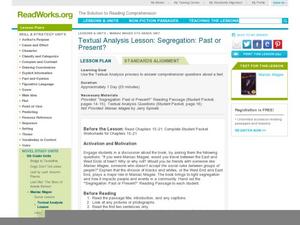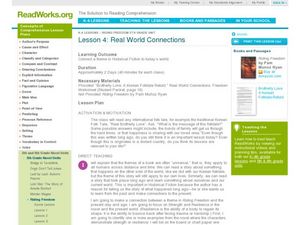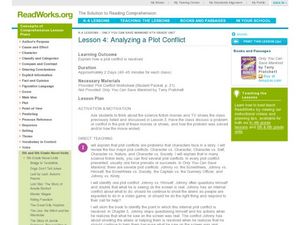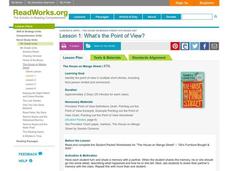Curated OER
Genre Lesson: Biography/Autobiography
Practice distinguishing biography from autobiography through point of view. Tell a brief story of your morning. Have a class member retell the story to you (using second person). And have another retell the story to the class (using...
Curated OER
Genre Lesson: Autobiography
Start kids thinking about point of view and autobiographies by telling them a short story about your morning (first person), and then asking a volunteer to re-tell the story to you (second person). There are tips to help you tie this...
Curated OER
Textual Analysis Lesson: Segregation: Past or Present?
Are your scholars reading Jerry Spinelli's Maniac Magee? If so, use this textual analysis packet and lesson guide to drive deeper thinking about the characters, create personal connections, and apply historical contexts to the text....
Curated OER
Genre Lesson: Poetry
Hook kids into a study on poetry elements by asking them to bring in the lyrics to their favorite song. Discuss the elements in one or two songs (preferably that demonstrate rhyme, figurative language, or a repeating phrase). Groups do...
Curated OER
Real World Connections
Explore universal themes in literature with a literacy and multicultural awareness lesson. Elementary and middle schoolers make real world connections between themes in books from several cultures. They make inferences and locate text...
Curated OER
Interpreting Perspective
Work on characterization with a narrative writing lesson, in which middle schoolers interpret a character's perspective. They discuss family traditions and examine how culture can influence a character's perspective. Next, they read...
Curated OER
Predicting a Mystery's Solution
Practice making informed predictions. Have your class create a paper fortune-teller and ask questions about the future. They compare the fortune-telling process to the more informed kind of predictions they make while reading. They...
Curated OER
Poetic Word Choice
Groups or pairs choose ordinary objects from a bag and rename them based on traits, so that a stapler becomes a "paper cobra." Then they connect this exercise to the way authors use language to emphasize certain traits through word...
Curated OER
Analyzing a Plot Conflict
Sixth graders analyze plot conflict with science fiction and TV programs. After discussing the conflict, they identify solutions for the programs selected. They examine Only You Can Save Mankind for conflict, and consider ways the...
Curated OER
The Effects of Character Decisions
Learners explore characters' decisions. They play a card game in which they match a decision card with a direct effect card. Then they examine characters from The Wizard of Oz, record important decisions that they make on index cards,...
Curated OER
Lesson 4: Theme Matters
This useful approach to determining themes based on specific details from a book is aimed at readers of Jerry Spinelli's Maniac Magee. It could also easily be adapted for use with other books or readings. The class identifies recurring...
Curated OER
Using Compare and Contrast Key Words
Compare and contrast while challenging your class with this higher-level thinking and reading comprehension lesson. After observing the teacher model comparing and contrasting bats and birds, learners read passages about two towns. They...
Read Works
Signal Words in Expository Text
Signal words are one way that authors make the relationships between their ideas clear. Allow your learners the chance to investigate cause and effect in texts by identifying signal words. They locate and analyze cause-and-effect...
Curated OER
Thinking About Theme
Writers use the literary element of conflict to develop their theme. Use the conflict between the Johnny and the ScreeWees in Terry Pratchett’s Only You Can Save Mankind to model how a major theme is revealed. The conflict between the...
Read Works
The Language of Setting
Examine the connection between descriptive language and emotional impact. For the first few chapters of The Lion, the Witch and the Wardrobe by C.S. Lewis, learners record the descriptive writing the author used to vivify the woods in...
Curated OER
Which Story Matches the Given Theme?
Model for young learners how to determine the theme of a story. Read aloud Aesop’s The Fox and the Stork. Chart the plot and the main idea of the fable, showing class members how these elements support the theme. Fable titles for guided...
Curated OER
Deciding Theme
Read aloud to your class the fable "The Lion and the Mouse" as you explore characters' choices and the effects they have on a story. Apply what is discussed to finding a theme of the chapter "Not Giving Up" from The Wizard of Oz.
Curated OER
Two Settings
Learners respond to the text Riding Freedom. They will compare and contrast two settings by filling in a graphic organizer. They explore different settings, discuss the reasons why settings change, and draw conclusions using descriptive...
Curated OER
Strategies for Identifying Genres
Examine the different strategies that could be used to determine what genre something is with upper graders. They will learn that knowing the genre type can sometimes help their comprehension. They will also complete a worksheet to help...
Curated OER
What's the Point of View?
Sixth graders explain what a point of view is. They list two different types of examples of third person point of view and identify the difference between a third person limited and third person omniscient . Additionally, they read a...
Curated OER
What's the Point of View?
What is the point of view? Sixth graders discuss third person limited and omniscient perspectives while reading several short stories. Then, complete a worksheet and share findings with peers.
Mr. Nussbaum
French and Indian War
Scholars read a short information text about the French and Indian War, then answer 10 multiple-choice questions. A score sheet appears when all the questions have been answered.
Mr. Nussbaum
Christopher Columbus
A short informative text features the European explorer, Christopher Columbus. Scholars read or listen to the text then answer ten fill-in-the-blank and multiple-choice questions.
Perkins School for the Blind
Please Call Me Names!
Teaching students who are blind means teaching them skills a sighted person may take for granted. To practice calling people and objects by name, learners engage in a cueing activity. The child calls for an adult by name, and then uses a...

























